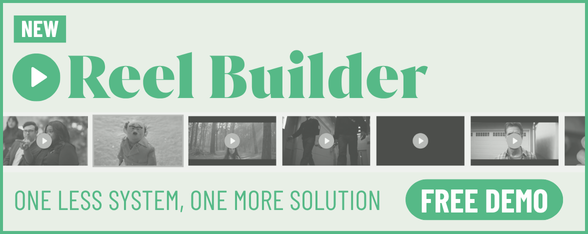
Meet Your Makers: Staying Cool, Calm and Collected with Nicole Lundy

Nicole has over 20 years of experience in the advertising business as an integrated content producer, including broadcast TV, digital and social media.
She’s worked with many respected agencies including Deutsch, Ogilvy, 72andSunny, Crispin Porter + Bogusky, BBDO, Saatchi and Brownstein, and on a wide variety of brands such as American Express, Toyota, Zillow, Sonos, Old Navy, AT&T and Microsoft.
Nicole was born and raised in Philadelphia, and has resided in both NY and LA.
LBB> What first attracted you to production - and has it been an industry you’ve always worked on or did you come to it from another area? What was your first role in the production world and how did this experience influence how you think about production and how you grew your career?
Nicole> As a high school senior, I was able to pick an internship and thought advertising would be fun so I chose an opportunity with an agency in Philadelphia that had an in-house production company. During that role, I worked in a very high-traffic part of the office that afforded me exposure to all different types of the business. Everything was a learning process, especially as I went along on shoots with the agency and was able to observe the exciting behind-the-scenes work. Fast forward to college, I majored in psychology and thought I had left advertising in the rear view. But after graduation, I found my way back to the industry when trying to figure out my career path. My first official role was in a small 10-person agency and I got to touch nearly every part of the business – from account management, to production, and even accounting! A colleague at that job suggested I might be a good producer, and the thought really piqued my interest. From there, I started my career in production and never looked back.
LBB> A good producer should be able to produce for any medium, from film to events to digital experience. Do you agree or disagree with this statement? Why/why not?
Nicole> I do agree with this. However, even before thinking about those pieces, any good producer needs to have foundational skills that are applicable to any medium. So, once you are able to manage deadlines, budgets and all different personality types (all while still keeping your cool), figuring out the medium should be the easiest part. Yes, there are nuances in each medium that you’ll learn on the job, but those foundational skills are essential in allowing you to do so.
LBB> What’s your favourite thing about production and why?
Nicole> The thing that I’ve always loved about production and advertising in general is how each production is always a little different. It’s exciting that every board or script I dive into is unique from the last. Sure, the steps might be the same in terms of location scouting or casting, but there’s always something unique about each production – and that certainly keeps me fresh and excited about the job. It also doesn’t hurt to be working with creative like-minded people who are all trying to make and sell the best we can, and have fun while doing it.
LBB> How has production changed since you started your career? And what has stayed the same?
Nicole> The biggest change I’ve seen in production throughout my career is timing. Likely due to increase in reliance on technology and how connected we are to each other, I find that schedules have been crunched across the board. This means less time for director searches, bidding, prep and the whole production process. While I don’t think it fully impacts our work, I have noticed this shift towards much tighter timelines. On the flip side, one thing that has stayed the same is the creative teams and directors I work with always striving for the best – even despite shorter timelines and other shifting industry dynamics.
LBB> What do you think is the key to being an effective producer - and is it something that’s innate or something that can be learned?
Nicole> I think it’s a little bit of both. At the end of the day, being an effective producer comes down to one thing: staying cool, calm and collected regardless of the circumstances. Whether that’s an innate nature about someone, or they need to learn that dynamic along their career path, producers need to stay even keel. In fact, the common denominator of all the best producers I’ve worked with is a very calm demeanor even if something is going haywire behind the scenes; as well as ability to be comforting to clients, vendors and partners on set. If the producer is visibly nervous, it causes a ripple effect that impacts the end product.
LBB> Which production project from across your career are you most proud of and why?
Nicole> I worked on the launch of Sonos – which was equal parts challenging and fun. The concept was to highlight musicians who genuinely loved the product by going to their homes and shooting them in their natural environment listening to their Sonos. We worked with some great artists like Questlove and Janelle Monae in such a unique and improvisational way throughout their normal lives. It was unlike any other project I had worked on to that point, and I’m still so proud of that production to this day.
LBB> And in terms of recent work, which projects have you found to be particularly exciting or have presented particularly interesting production challenges?
Nicole> Working on the NJM 'No Jingles or Mascots' launch was a big moment for me. I was proud to be part of such a successful campaign and get that off the ground. It’s really smart, eye-catching memorable work.
LBB> Producers always have the best stories. What’s the hairiest / most insane situation you’ve found yourself in and how did you work your way out of it?
Nicole> Recently, I was working on a shoot for a client where we were featuring an older talent pool in the ad. The spot required the actors to be quite active, hitting tennis balls and walking quite fast-paced throughout the set. Unfortunately, the lead actor that we hired was just not cutting it – he was visibly out of breath and the activity was too much for him. We initially were in a bit of a panic but one of the crew members saved the day! It turns out the first assistant director was in the right demographic, and we quickly realized he had some acting chops. We had him fill in for the actor – and he was amazing! In fact, it wasn’t just a quick “save”. This commercial ended up testing the highest out of all other spots in that campaign.
LBB> What advice would you give to people who are interested in becoming a producer?
Nicole> I think the best way to get experience in production is shadowing producers in the field. Start offering to lend a hand at shoots and edits – even if that means odd hours, nights or weekends; whenever you can and show your dedication and willingness to learn. I was an assistant producer when I first started doing some radio production and editing, mainly smaller projects just to get my feet wet. In that role, I started following producers that I admired at the agency around, asking to shadow them on shoots and edits. I learned so much and it also showed my commitment to get the experience…which definitely paid off.
LBB> From your experience what are the ingredients for a successful production?
Nicole> A successful production starts with good collaboration and trust between agency, client and production company/director. If everyone is on the same page and willing and able to work and evolve together, the creative is typically a success.
LBB> Producers are naturally hands on - they have to be. How do you balance that in the more managerial role of an EP?
Nicole> I work very closely with the producers at Brownstein so I know exactly what is going on at all times. I think the key is finding the right balance of letting go and trusting the people you work with while still keeping a close eye on the details and being able to step in at any time if needed.













